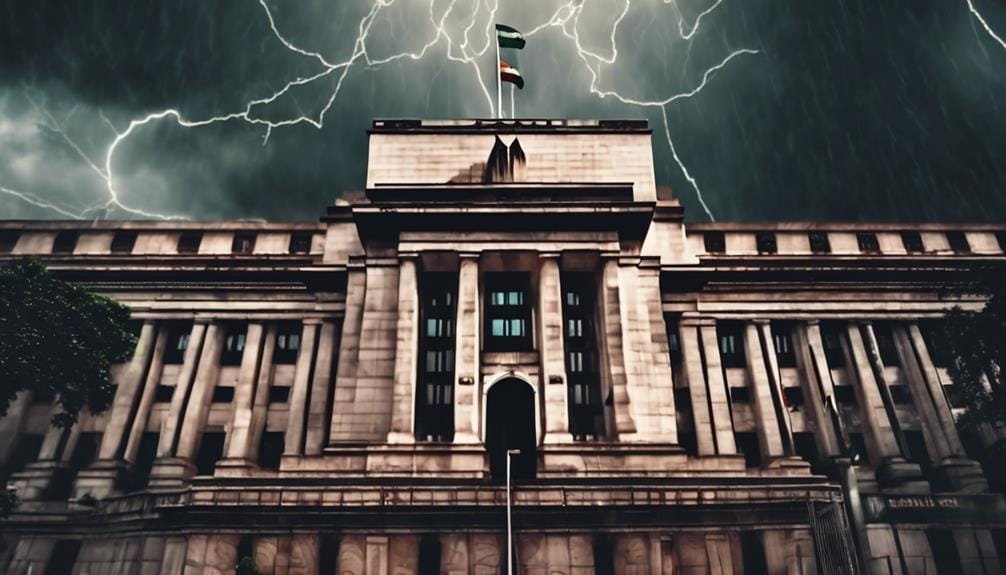The Reserve Bank of India (RBI) opposes private cryptocurrencies primarily due to concerns about financial stability and the potential for illegal activities. These cryptocurrencies, which prioritize user anonymity, complicate efforts to track transactions, raising issues like money laundering and tax evasion. Additionally, their extreme price volatility poses risks to investors and the broader financial system. The RBI also emphasizes the absence of consumer protection in a largely unregulated environment, making users vulnerable to scams. As debates continue, the RBI is exploring a regulated digital currency to provide a safer alternative. There’s more to uncover about the implications of these developments.
Table of Contents
Brief Overview of Private Cryptocurrency Is Opposed By RBI
- The RBI opposes private cryptocurrencies due to concerns about financial stability and market volatility impacting the economy.
- Anonymity of private cryptocurrencies facilitates illegal activities like money laundering and tax evasion, raising red flags for regulators.
- The lack of consumer protection in the private cryptocurrency space leaves investors vulnerable to scams and financial losses.
- The RBI’s previous ban on banking transactions related to cryptocurrencies was ruled against by the Supreme Court due to insufficient evidence of harm.
- The RBI is exploring a Central Bank Digital Currency (CBDC) as a regulated alternative to enhance financial stability and consumer safety.
What Are Private Cryptocurrencies
Private cryptocurrencies, unlike public ones such as Bitcoin, prioritize user anonymity and privacy. They often utilize advanced techniques, like zero-knowledge proofs, to enable anonymous transactions, which can raise concerns about their potential for misuse.
As the Indian government proposes a ban on these private cryptocurrencies to enhance financial security, the Reserve Bank of India (RBI) opposes these private cryptocurrencies due to their unregulated nature and the risks they pose to financial stability, particularly regarding issues like money laundering and tax evasion.
Private vs. Public Cryptocurrencies
When comparing cryptocurrencies, it’s essential to understand the distinction between public and private types. Public cryptocurrencies, like Bitcoin, operate on a transparent system where every transaction is recorded on a public ledger. This openness can provide a sense of security, as anyone can verify transactions, reducing the likelihood of fraud.
However, this transparency can also lead to privacy concerns, as user identities may be inferred from transaction data. In India, Bitcoin is recognized as an asset, allowing trading and investment, but it isn’t classified as legal tender, which adds another layer of complexity to its use in transactions cryptocurrency trading is legal in India.
On the other hand, private cryptocurrencies focus on enhancing user anonymity. These are often referred to as privacy coins, with Monero being a notable example. In these systems, transaction details are concealed, making it challenging for third parties to trace the flow of funds.
While this can offer a higher level of privacy, it raises concerns for regulators like the Reserve Bank of India (RBI), which opposes private cryptocurrencies due to potential misuse and lack of consumer protection.
Ultimately, when choosing between public and private cryptocurrencies, consider your priorities. If safety and transparency are vital, public cryptocurrencies may be the way to go. However, if anonymity is your goal, you might explore the world of anonymous crypto.
RBI’s Stand on Private Cryptocurrencies
The RBI’s stand on private cryptocurrencies is clear: it firmly opposes them due to serious concerns about financial stability and regulatory oversight.
The anticipated date for the bill’s passage could shift, reflecting evolving regulatory landscapes.
Officials have pointed out the risks these cryptocurrencies pose, including their potential for facilitating illegal activities and lacking consumer protection.
As the RBI studies these issues further, it’s also considering the introduction of a regulated digital currency to provide a safer alternative for users.
Statements by RBI Officials
RBI officials have consistently voiced strong opposition to private cryptocurrencies, emphasizing the significant risks they pose to financial stability. They argue that the decentralized nature of these currencies creates challenges that could lead to severe consequences for the economy.
Here are some key concerns highlighted by RBI officials regarding private cryptocurrencies:
- Financial Instability: The RBI believes that the volatility of private cryptocurrencies can create unpredictable fluctuations in the market, threatening overall economic stability.
- Money Laundering: There’s a strong association between private cryptocurrencies and illicit activities, including money laundering, due to their anonymous transactions.
- Lack of Regulation: The absence of a regulatory framework means there’s no oversight, leaving consumers vulnerable to scams and fraud.
- Consumer Protection: Without proper regulation, users have limited recourse in cases of loss or theft, raising concerns about their safety.
These statements reflect the RBI’s stance against private cryptocurrencies, asserting that private cryptocurrency is opposed by RBI to maintain a secure financial environment.
As the RBI explores crypto regulation in India, it seeks to safeguard the economy from these potential dangers.
Why Does RBI Oppose Private Cryptocurrencies?

You might wonder why the RBI opposes private cryptocurrencies like Bitcoin.
The central bank raises alarms over the financial risks these decentralized currencies bring, such as the potential for illegal activities like money laundering and terrorist financing.
Additionally, the lack of regulations leaves consumers unprotected, which could ultimately destabilize India’s financial system.
Financial Risks Associated With Private Cryptocurrencies
In recent years, the rise of private cryptocurrencies has raised significant concerns about their financial implications.
The Reserve Bank of India (RBI) firmly believes that private cryptocurrency is opposed by RBI due to various financial risks associated with it.
Here are several key risks to evaluate:
- Undermining Financial Stability: Private cryptocurrencies could disrupt the established financial system, making it harder for regulatory bodies to maintain control.
- Untraceable Transactions: The anonymity of these currencies can lead to a lack of transparency, complicating efforts to track financial activities.
- Consumer Protection Issues: Without proper regulation, users are vulnerable to fraud and other financial crimes, as there’s no recourse for losses.
- Market Volatility: The extreme price fluctuations in private cryptocurrencies can lead to significant financial losses for investors, further threatening economic stability.
These financial risks of cryptocurrency highlight the necessity for effective cryptocurrency regulation in India.
The RBI continues to explore these issues, aiming to implement suitable RBI crypto regulations that foster a secure financial environment while mitigating potential disruptions.
Potential For Illegal Activities
Private cryptocurrencies are opposed by RBI primarily due to their potential for facilitating illegal activities. The decentralized and untraceable nature of these currencies makes them attractive for various illicit purposes. This raises serious concerns about safety and stability in the financial system.
Here’s a breakdown of how private cryptocurrencies can be misused:
| Illegal Activity | Description | Impact |
|---|---|---|
| Cryptocurrency Money Laundering | Funds can be easily obscured, making it hard to trace origins. | Erodes financial integrity. |
| Terrorist Financing | Cryptocurrencies can fund operations without detection. | Threatens national security. |
| Tax Evasion | Individuals can hide income from authorities. | Reduces government revenue. |
| Fraud | Scammers exploit the anonymity to defraud users. | Diminishes trust in financial systems. |
| Drug Trafficking | Facilitates transactions for illegal goods. | Promotes criminal enterprises. |
Given these concerns, the RBI is advocating for a private cryptocurrency ban. They believe that without strict regulations, the risks of illegal activities will undermine the safety of the financial ecosystem.
Timeline of RBI’s Position on Cryptocurrency
The Reserve Bank of India‘s stance on cryptocurrency has evolved considerably over time.
Initially, the RBI issued warnings about the risks associated with private cryptocurrencies, leading to a ban on banking services for crypto transactions.
However, after the Supreme Court ruling lifted this ban, the RBI continues to oppose private cryptocurrencies, emphasizing the need for regulation and consumer protection.
Initial Warnings by RBI
Warnings from the Reserve Bank of India (RBI) about private cryptocurrencies have been clear and consistent since the early days of their emergence.
The RBI has issued several alerts, emphasizing the risks associated with these digital assets. Their position on RBI and cryptocurrency has evolved, reflecting growing concerns.
Here’s a timeline of the initial warnings:
- 2013: The RBI first issued a public notice, cautioning users about the risks tied to virtual currencies and the lack of regulatory oversight.
- 2017: As private cryptocurrency popularity surged, RBI intensified its private cryptocurrency warnings, highlighting vulnerabilities like fraud and market volatility.
- 2018: The RBI announced a ban on banks facilitating cryptocurrency transactions, marking a pivotal moment in the RBI crypto ban timeline.
- 2019: Further crypto warnings in India reiterated the absence of customer protections and the potential for misuse.
These cryptocurrency alerts from the RBI serve as a significant reminder for investors seeking safety.
It’s vital to stay informed about the potential dangers associated with private cryptocurrencies, as the RBI continues to advocate for regulated alternatives.
Supreme Court Ruling
In a landmark decision, the Supreme Court of India intervened to overturn the RBI’s banking ban on cryptocurrencies, reshaping the landscape of cryptocurrency regulation in the country. This ruling addressed the ongoing legal battle between the RBI and the Indian crypto community, emphasizing the need for balanced cryptocurrency law in India. The court recognized the importance of innovation while ensuring consumer protection.
Here’s a breakdown of the timeline surrounding the Supreme Court cryptocurrency ruling:
| Year | Event | Description |
|---|---|---|
| 2018 | RBI Crypto Ban | RBI imposed a ban on banks dealing with crypto assets. |
| 2020 | Supreme Court Intervention | The Supreme Court ruled against the RBI ban, citing lack of substantial evidence for potential harm. |
| 2021 | Regulatory Discussions | Ongoing talks about cryptocurrency regulation in India began. |
| 2022 | Proposed Regulations | The government started drafting laws to regulate private cryptocurrencies and enhance safety. |
This ruling marked a significant shift in cryptocurrency regulation in India, highlighting the need for a framework that addresses safety concerns while promoting innovation. As the landscape evolves, it’s essential to stay informed about developments regarding the private cryptocurrency ban and emerging regulations.
Impact of RBI’s Opposition on Indian Crypto Market

RBI’s strong opposition to private cryptocurrency greatly shapes the landscape of the cryptocurrency market in India.
This stance not only impacts investor sentiment, leading to hesitance among potential buyers, but also creates challenges for exchanges trying to operate under uncertain regulations.
As you navigate this complex environment, understanding how RBI’s position affects both trading behaviors and overall market dynamics becomes essential.
Investor Sentiment
The Reserve Bank of India’s strong opposition to private cryptocurrencies has stirred a wave of uncertainty among Indian crypto investors. As the RBI continues its stance, the cryptocurrency ban impact is evident, leading to increased market volatility and hesitation.
Here are some key factors affecting crypto investor sentiment:
- Regulatory Concerns: Investors feel anxious about the lack of regulation surrounding private cryptocurrencies, fearing potential losses.
- Market Volatility: The uncertainty surrounding RBI’s stance has caused significant fluctuations in crypto prices, discouraging long-term investment.
- Lack of Consumer Protection: Without regulation, many investors worry about the safety of their investments in private cryptocurrencies.
- Shift to Public Cryptocurrencies: As Indian crypto investors reconsider their options, there’s growing interest in public cryptocurrencies India may support, which might offer more stability.
These elements contribute to a cautious approach among investors. Many are choosing to hold back on investments, waiting for clearer regulations.
As the RBI explores alternatives, understanding the current investor sentiment becomes essential for maneuvering this evolving landscape.
Cryptocurrency Exchange Challenges
Crypto exchanges in India are grappling with significant challenges stemming from the RBI’s opposition to private cryptocurrencies. The ongoing Private Cryptocurrency Ban raises concerns about access to banking services. Without the ability to transact with banks, exchanges struggle to facilitate user deposits and withdrawals, creating Cryptocurrency Exchange Problems that could erode trust among users.
Moreover, the lack of clear guidelines from RBI Cryptocurrency Regulations contributes to Crypto Regulatory Uncertainty. This ambiguity makes it difficult for exchanges to operate within a legal framework, leaving them vulnerable to sudden changes in policy. As a result, many exchanges face difficulties in obtaining licenses or maintaining partnerships with banks, further crippling their operations.
To build a safe environment for users, exchanges must navigate these obstacles carefully, reassuring clients about their financial security. The uncertainty surrounding the RBI’s stance on cryptocurrencies can deter potential investors, who might fear losing their funds in an unpredictable regulatory landscape.
In this climate, crypto exchanges in India need to prioritize transparency and compliance to foster trust and stability, ultimately aiming to create a more secure market for everyone involved.
RBI vs. Cryptocurrency Exchanges
You might be aware that the RBI’s stance against private cryptocurrencies has created significant friction with crypto exchanges in India.
As these exchanges navigate banking restrictions and regulatory uncertainties, they’ve found themselves in ongoing legal battles with the RBI.
This complicated landscape raises questions about the future of crypto trading and the potential for more defined regulations.
Legal Battles Between Exchanges and RBI
While traversing the complex landscape of cryptocurrency, exchanges in India have found themselves embroiled in legal battles with the Reserve Bank of India (RBI).
These Crypto Exchange Legal Battles highlight the ongoing conflict in the domain of RBI vs Cryptocurrency. The RBI’s opposition to private cryptocurrencies has led to significant legal disputes.
Here are some key aspects of these legal battles:
- Past Rulings: The Supreme Court overturned RBI’s 2018 circular that banned banks from dealing with cryptocurrency exchanges, marking a victory for the exchanges.
- Pending Cases: Despite the ruling, ongoing legal disputes remain as the RBI continues to explore stricter Crypto Regulations in India.
- Adaptation: Exchanges have adapted their operations to comply with evolving regulations, seeking to provide safety for users amid uncertainties.
- Future Implications: The potential Private Cryptocurrency Ban India could reshape the industry, forcing exchanges to rethink their strategies.
These legal disputes underscore the importance of consumer protection and regulatory clarity in the cryptocurrency space, emphasizing the delicate balance between innovation and safety.
Current State of Crypto Exchanges
In the face of regulatory challenges, cryptocurrency exchanges in India are adapting to the Reserve Bank of India‘s (RBI) ongoing opposition. Despite the RBI’s firm stance against private cryptocurrencies, these exchanges are finding innovative ways to operate within the constraints of Cryptocurrency Regulation India.
Many have shifted focus to P2P crypto trading, which allows users to buy and sell directly with one another, effectively bypassing some of the restrictions imposed by the RBI. This pivot to P2P trading not only offers a workaround but also enhances user security, as it minimizes the need for centralized exchanges that could be vulnerable to regulatory crackdowns.
As the RBI opposes crypto, the Cryptocurrency Market in India is witnessing a rise in decentralized platforms that prioritize user safety and privacy. Exchanges are also enhancing their compliance frameworks to align with potential regulatory measures while continuing to educate users about the risks involved.
Legal Challenges and Supreme Court Rulings

The legal landscape around cryptocurrencies in India has seen significant shifts, especially following the Supreme Court’s 2020 ruling that lifted the RBI’s banking ban on cryptocurrencies.
This decision sparked ongoing discussions about cryptocurrency law in India, leaving several pending legal cases that could shape the future of private cryptocurrencies.
As you explore these developments, it’s essential to understand how the RBI and various stakeholders navigate the complexities of crypto legal issues.
Key Supreme Court Judgments
Recent Supreme Court judgments have significantly impacted the cryptocurrency landscape in India, particularly regarding the Reserve Bank of India’s (RBI) stance on digital currencies.
These rulings have played a vital role in shaping the ongoing Crypto Legal Battles India, especially in challenging the RBI Crypto Ban.
Here are some key points from these Supreme Court Judgment Crypto:
- Overturning the RBI Ban: The Supreme Court Cryptocurrency Ruling in March 2020 overturned the RBI’s ban on banks dealing with cryptocurrency exchanges, citing the lack of proportionality in the RBI’s actions.
- Consumer Protection: The Court emphasized the importance of protecting consumers and the need for a balanced regulatory framework for cryptocurrencies.
- Legal Recognition: The rulings have paved the way for clearer Cryptocurrency Law India, providing a basis for future regulations.
- Encouraging Innovation: By allowing cryptocurrency trading, the Court has encouraged innovation in financial technology, contributing to a more dynamic economic environment.
These judgments reflect a significant shift towards a more favorable legal stance on cryptocurrencies, enabling safer participation in the digital economy while still addressing concerns raised by the RBI.
Pending Legal Cases
As the legal landscape for cryptocurrencies in India evolves, several pending legal cases could greatly influence the future of private cryptocurrencies and their regulation.
Currently, the most significant pending cryptocurrency cases in India revolve around the RBI’s stance on cryptocurrencies. The Reserve Bank of India has been vocal about its concerns, leading to ongoing crypto legal issues that might result in a private cryptocurrency ban.
These cryptocurrency court cases challenge the RBI’s authority and its regulatory framework. They question whether the RBI can impose strict restrictions on digital currencies without adequate legislative backing.
The outcomes of these cases are vital, as they could set a precedent for future regulations. If the courts side with the RBI, it may lead to a more restrictive environment for private cryptocurrencies, impacting investors and developers alike.
Conversely, if the courts rule against the RBI, the legal foundation for private cryptocurrencies could strengthen, allowing for safer and more transparent practices.
As you navigate this uncertain terrain, staying informed on these pending cases will be essential in understanding the future of cryptocurrencies in India.
Global Perspective on Private Cryptocurrencies
When you look at how different countries handle private cryptocurrencies, you’ll notice a wide range of approaches.
In the U.S., there’s a mix of regulation and acceptance, while China has imposed strict bans on these digital assets.
This contrast raises important questions about India’s stance on private cryptocurrencies and how it measures up against global trends.
Private Cryptocurrency Regulations in the U.S
While many countries grapple with the implications of private cryptocurrencies, the United States has established a more organized approach to their regulation. The U.S. recognizes the need for a balance between innovation and consumer protection, unlike India, which is leaning toward a cryptocurrency ban.
Here are four key aspects of private cryptocurrency regulations in the U.S.:
- Regulatory Framework: The U.S. has multiple regulatory bodies, including the SEC and CFTC, overseeing cryptocurrency activities.
- Consumer Protection: Regulations emphasize safeguarding consumers from fraud and market manipulation, addressing significant cryptocurrency risks.
- Taxation: Cryptocurrencies are treated as property for tax purposes, requiring individuals to report gains and losses.
- Compliance: Companies dealing with cryptocurrencies must adhere to Anti-Money Laundering (AML) and Know Your Customer (KYC) regulations.
These elements contribute to a more thorough approach to global cryptocurrency regulation.
Bans in China and Other Nations
Several countries have adopted strict measures against private cryptocurrencies, with China leading the way through its outright ban. The China Cryptocurrency Ban reflects the government’s serious concerns about financial stability, fraud, and capital flight.
This decisive action has set a precedent for Private Cryptocurrency Bans Worldwide, influencing other nations to contemplate similar restrictions.
In contrast, India has taken a more measured approach. While the Reserve Bank of India (RBI) has expressed its opposition to private cryptocurrencies, it’s exploring regulatory frameworks rather than imposing an outright ban.
The RBI crypto impact focuses on safeguarding consumer interests and addressing the risks associated with cryptocurrencies. This regulatory perspective aims to balance innovation with financial security, ensuring that the digital currency landscape remains safe for investors.
Other countries are also weighing their options regarding crypto regulations. As nations navigate the complexities of private cryptocurrencies, the global response varies considerably.
RBI’s Vision for Central Bank Digital Currency (CBDC)

The RBI’s vision for a Central Bank Digital Currency (CBDC) positions the Digital Rupee as a secure and regulated alternative to private cryptocurrencies.
Unlike decentralized currencies that lack oversight, the RBI CBDC aims to provide a government-backed solution that prioritizes financial stability and consumer protection.
Understanding how this shift could impact the market is essential, as it highlights the differences between private cryptocurrency and a government digital currency in India.
Digital Rupee vs. Private Cryptocurrencies
Private cryptocurrencies like Bitcoin operate in a decentralized environment that lacks regulatory oversight, posing significant risks to users and the financial system.
The Reserve Bank of India (RBI) emphasizes the need for a safer alternative: the Digital Rupee, or Central Bank Digital Currency (CBDC).
Unlike private cryptocurrencies, the Digital Rupee offers several advantages:
- Regulatory Control: The RBI oversees transactions, ensuring compliance with financial regulations.
- Transparency: Transactions on the CBDC platform are traceable, reducing the risk of fraud and misuse.
- Consumer Protection: Users are safeguarded by established banking laws, unlike in the private cryptocurrency market.
- Stability: The RBI Digital Currency is less volatile compared to private cryptocurrencies, providing a more reliable store of value.
In the debate of Private Cryptocurrency vs CBDC, the Digital Rupee represents a secure option for individuals and businesses alike.
As CBDC India moves forward, it aims to maintain financial stability while offering a modernized approach to currency.
How CBDC Could Impact the Market
Introducing a Central Bank Digital Currency (CBDC) like the Digital Rupee could markedly reshape the Indian crypto market. With the Reserve Bank of India’s (RBI) strong stance against private cryptocurrencies, the potential for a regulated digital alternative offers a safer option for consumers.
The Digital Rupee Impact may lead to greater financial stability and consumer protection, which are often lacking in private cryptocurrency transactions.
As the CBDC Market in India develops, you might witness a gradual shift away from private cryptocurrencies. This shift could be accelerated by a Private Cryptocurrency Ban, making the Digital Rupee the primary choice for digital transactions.
By addressing existing crypto legal issues in India, the RBI aims to build trust and confidence among users.
A regulated India Digital Currency wouldn’t only simplify transactions but also guarantee that they’re monitored and secure.
As more people embrace the Digital Rupee, you could see a decline in the popularity of private cryptocurrencies, as consumers prioritize safety and reliability.
Ultimately, the introduction of a CBDC could redefine how you engage with digital currencies, offering a more secure, regulated alternative to the volatile crypto market.
Cryptocurrency Regulation in India: The Future Outlook
As you consider the future of crypto regulation in India, it’s clear that the government is steering through a complex landscape.
Proposed laws may focus on balancing innovation with the need for consumer protection and financial stability, especially concerning private cryptocurrencies.
The India Cryptocurrency Bill could play a significant role in shaping this regulatory environment, potentially leading to a ban on certain private cryptocurrencies while fostering safer alternatives.
Proposed Laws and Regulations
The Indian government is gearing up to address the complexities surrounding cryptocurrencies with the introduction of proposed laws aimed at regulation. These laws are centered around the India Cryptocurrency Bill, which aims to establish a framework for Crypto Regulation in India.
The government’s approach includes a potential Private Cryptocurrency Ban, focusing on minimizing risks associated with unregulated digital currencies.
Here are four key aspects of the proposed crypto laws:
- Regulatory Framework: Establishing a clear structure for oversight to guarantee compliance and protection for investors.
- Consumer Protection: Enforcing measures that safeguard individuals from fraud and misuse within the cryptocurrency market.
- RBI CBDC: Exploring the introduction of a Central Bank Digital Currency (CBDC) as a regulated alternative to private cryptocurrencies.
- Taxation and Reporting: Implementing guidelines for taxation and mandatory reporting to curb illegal activities and enhance transparency.
These proposed crypto laws reflect the government’s commitment to creating a safer environment for digital currency transactions, addressing both the opportunities and challenges posed by cryptocurrencies in India.
Future of Private Cryptocurrencies
With the Indian government’s proposed laws on cryptocurrency regulation, the future of private cryptocurrencies faces significant uncertainty.
The Reserve Bank of India (RBI) and the Securities and Exchange Board of India (SEBI) are at the forefront of discussions, emphasizing the need for clear guidelines to guarantee consumer protection and financial stability.
As regulatory measures develop, the possibility of a private crypto ban looms, which could drastically alter the landscape for investors and innovators alike.
Investor demand for private cryptocurrencies remains high, driven by their potential for high returns and decentralized nature.
However, the ongoing debates about crypto regulation in India could dampen enthusiasm.
The cryptocurrency timeline in India indicates that swift changes may occur, depending on governmental decisions and RBI’s findings.
If the government chooses to regulate rather than ban private cryptocurrencies, it may lead to a safer environment for investors, allowing the crypto market in India to flourish responsibly.
Ultimately, the future of private cryptocurrencies hinges on how effectively regulators can balance innovation with the need for security and stability in the financial system.
Impact on Indian Investors

As an Indian crypto investor, you may feel uncertain about the future due to the RBI’s strong opposition to private cryptocurrencies.
This stance not only influences market volatility but also shapes your sentiment toward investing in public cryptocurrencies or global exchanges.
Understanding these dynamics can help you navigate potential risks and explore alternative investment avenues more effectively.
Market Volatility and Investment Risks
Steering through the world of cryptocurrencies can feel like walking a tightrope for Indian investors, especially given the RBI’s strong opposition to private cryptocurrencies.
This stance has led to significant crypto market volatility, creating an environment rife with investment risks. Understanding these risks is vital for anyone contemplating entering this space.
Here are four key aspects to reflect on:
- Price Fluctuations: The value of cryptocurrencies can swing dramatically in a short period, often triggered by regulatory news or market sentiment.
- Regulatory Uncertainty: With the RBI’s ongoing opposition, the future of private cryptocurrencies remains unpredictable, adding layers of risk for investors.
- Lack of Consumer Protection: Unlike traditional investments, cryptocurrencies often lack safeguards, exposing investors to potential losses without recourse.
- Market Manipulation: The decentralized nature of these currencies makes them susceptible to manipulation, further increasing investment risks.
For Indian crypto investors, these private cryptocurrency risks are compounded by the RBI’s actions.
It’s important to stay informed and approach investments with caution, ensuring your financial security remains a priority amidst the volatility.
Investor Sentiment Toward Public Cryptocurrencies
Amidst the uncertainty surrounding private cryptocurrencies, Indian investor sentiment is increasingly gravitating toward public cryptocurrencies like Bitcoin and Ethereum.
As the Reserve Bank of India (RBI) considers a potential private cryptocurrency ban, many investors are seeking the relative safety and regulatory oversight associated with public options.
Public cryptocurrencies are often viewed as more stable in comparison to their private counterparts, which lack clear frameworks and consumer protections.
This shift in sentiment reflects a desire for financial stability amid ongoing discussions about cryptocurrency regulation in India. Indian investors are keenly aware of the risks tied to unregulated private coins, prompting them to explore more established public cryptocurrencies.
With the RBI conducting studies on the implications of cryptocurrencies, the prospect of clearer regulations could further bolster investor confidence in public cryptocurrencies.
As you navigate this evolving landscape, focusing on public options may provide a safer investment avenue.
The Role of SEBI and Other Regulatory Bodies
When you think about the role of SEBI in cryptocurrency regulation, it’s vital to understand how its stance interacts with that of the RBI.
SEBI focuses on protecting investors and overseeing crypto-related activities, possibly differing from the RBI’s cautious approach.
This coordination between SEBI and RBI is important for creating a thorough regulatory framework in India’s evolving crypto landscape.
SEBI’s Role in Cryptocurrency Oversight
The Securities and Exchange Board of India (SEBI) plays an essential role in overseeing cryptocurrency regulations alongside the Reserve Bank of India (RBI). With the rising popularity of cryptocurrencies, SEBI’s involvement is vital for guaranteeing a secure investment environment.
Here are some key aspects of SEBI’s role in cryptocurrency oversight:
- Market Surveillance: SEBI monitors trading activities to identify any irregularities or fraudulent practices in the cryptocurrency market.
- Investor Protection: By implementing regulations, SEBI aims to safeguard investors from potential losses and scams associated with cryptocurrency investments.
- Compliance with Anti-Money Laundering (AML): SEBI enforces AML regulations to prevent illicit activities and guarantee transparency within the crypto market.
- Collaboration with RBI: SEBI and RBI work together to create cohesive policies for Crypto Regulation India, addressing the challenges posed by private cryptocurrencies.
Through these measures, SEBI Cryptocurrency Regulation establishes a framework that promotes responsible trading while protecting investors.
Although the RBI primarily focuses on the risks of private cryptocurrencies, SEBI’s oversight complements these efforts, working to create a balanced regulatory environment for digital assets.
Coordination Between SEBI and RBI
Recognizing the complexities of the cryptocurrency landscape, SEBI and RBI have established a coordinated approach to regulate the crypto market in India.
These two regulatory bodies are essential in shaping the legal framework surrounding cryptocurrencies, particularly in the context of India’s evolving crypto regulation.
While RBI focuses on the risks posed by private cryptocurrencies, emphasizing consumer safety and financial stability, SEBI takes charge of overseeing market practices and investor protection.
Their collaboration is significant, especially as the Supreme Court cryptocurrency ruling has opened avenues for legal and regulated trading.
This decision highlights the need for an all-encompassing framework that addresses both crypto privacy and the rights of investors in peer-to-peer crypto transactions.
Together, SEBI and RBI are working to create a balanced regulatory environment that accommodates innovation while safeguarding against potential threats.
As you look to engage with the crypto space, understanding the roles of SEBI and RBI can help you navigate this complex landscape.
Their combined efforts aim to establish clear and effective crypto laws in India, ensuring a safer trading experience for all participants.
Alternatives for Indian Crypto Enthusiasts

If you’re an Indian crypto enthusiast looking for alternatives, consider exploring public cryptocurrencies that operate under regulatory frameworks.
Engaging with reputable crypto exchanges in India can also provide a safer environment for your investments.
Additionally, peer-to-peer platforms allow you to trade directly with others, offering more flexibility while maneuvering the current landscape of crypto regulations.
Public Cryptocurrencies as Alternatives
For Indian crypto enthusiasts seeking alternatives amid the ongoing private cryptocurrency ban, public cryptocurrencies like Bitcoin, Ethereum, and Litecoin offer viable options. These cryptocurrencies are recognized for their transparency and have established networks that can provide a sense of security in your investments.
Here are some key points to evaluate:
- Regulation: Public cryptocurrencies generally operate under more scrutiny, which can provide a layer of protection against fraud and misuse.
- Liquidity: Popular public cryptocurrencies tend to have high liquidity, making it easier for you to buy and sell when necessary.
- Widely Accepted: Many platforms and businesses accept public cryptocurrencies, increasing their practicality for everyday use.
- Community Support: Strong communities back public cryptocurrencies, offering resources and assistance if you encounter challenges.
While the Reserve Bank of India emphasizes caution regarding cryptocurrencies, these public options could serve as safer alternatives.
Peer-to-Peer Platforms
Many Indian crypto enthusiasts are turning to peer-to-peer (P2P) platforms as a way to trade amidst the uncertainties surrounding the private crypto ban. These platforms allow you to buy and sell cryptocurrencies directly with other users, providing an alternative to traditional exchanges. By using P2P platforms, you can maintain control over your transactions while steering through the regulatory landscape.
Here’s a quick comparison of popular P2P platforms available in India:
| Platform | Key Features | Safety Measures |
|---|---|---|
| LocalBitcoins | Wide user base, easy to use | Escrow system for transactions |
| WazirX P2P | Integrated with WazirX exchange | KYC verification |
| Paxful | Multiple payment options | User feedback and ratings |
| Binance P2P | Low fees, crypto-to-crypto trading | Escrow protection |
| Koinex P2P | Instant trades, user-friendly | Security protocols in place |
These platforms prioritize user security through features like escrow services and verification processes. While trading on P2P platforms, always make sure you’re vigilant and follow best practices to protect your investments. By leveraging these options, you can continue participating in the crypto market safely.
Conclusion
As the Reserve Bank of India (RBI) continues to oppose private cryptocurrencies, it’s essential for Indian crypto investors to understand the implications of this stance. The RBI’s concerns revolve around the lack of regulation and potential risks these decentralized currencies pose to financial stability.
As you navigate this landscape, consider the following key points:
- Regulatory Environment: The RBI is actively studying the economic implications of cryptocurrencies, which could lead to stringent regulations affecting private crypto investments.
- Consumer Protection: Without proper oversight, private cryptocurrencies lack consumer protection, making your investments vulnerable to fraud and misuse.
- Market Impact: The RBI’s opposition could lead to a decline in the value of private cryptocurrencies in India, influencing your investment decisions and portfolio diversification.
- Alternative Options: The RBI is exploring a regulated digital currency, which might provide a safer, government-backed alternative for your investment needs.
Given these factors, it’s vital to stay informed about the evolving regulatory landscape surrounding cryptocurrencies in India.
As debates continue regarding a potential cryptocurrency ban, prioritize safety in your investment choices. Always weigh the risks and potential returns before diving into private cryptocurrencies.
Keeping abreast of developments from the RBI will empower you to make wise, informed decisions in this rapidly changing market.
Frequently Asked Questions
Why Is RBI Against Cryptocurrency?
You might wonder why the Reserve Bank of India (RBI) is against cryptocurrency.
The RBI raises concerns about the lack of regulation, which can lead to financial instability. They argue that cryptocurrencies are highly volatile and lack intrinsic value, making them risky for consumers.
Additionally, the decentralized nature of these currencies poses challenges to monetary policy and government regulation, potentially threatening economic sovereignty.
The RBI advocates for an all-encompassing framework to protect consumers and guarantee stability.
What Is the RBI Warning on Crypto?
The RBI warns that cryptocurrencies lack intrinsic value and can pose significant risks to financial stability.
They emphasize that these digital currencies aren’t regulated, leading to potential misuse and a lack of consumer protection.
The RBI also highlights that unregulated crypto markets can destabilize traditional financial systems, increasing volatility and risks for investors.
Which Crypto Exchange Is Banned in India?
As of now, no specific cryptocurrency exchange is officially banned in India.
However, many exchanges operate in a regulatory gray area due to the Reserve Bank of India’s concerns about cryptocurrencies.
This lack of clear regulation can create risks for users, including potential misuse and loss of funds.
It’s essential for you to stay informed about the legal landscape and choose exchanges that prioritize security and compliance to protect your investments.
Summarizing
In summary, the RBI’s firm stance against private cryptocurrencies highlights concerns about regulation, financial stability, and consumer protection. As the central bank explores a regulated digital currency, Indian investors face uncertainty in the crypto market. The evolving landscape necessitates awareness of the roles played by regulatory bodies like SEBI. Ultimately, understanding the implications of these developments is essential for anyone interested in cryptocurrency in India, as it shapes the future of digital finance in the country.




